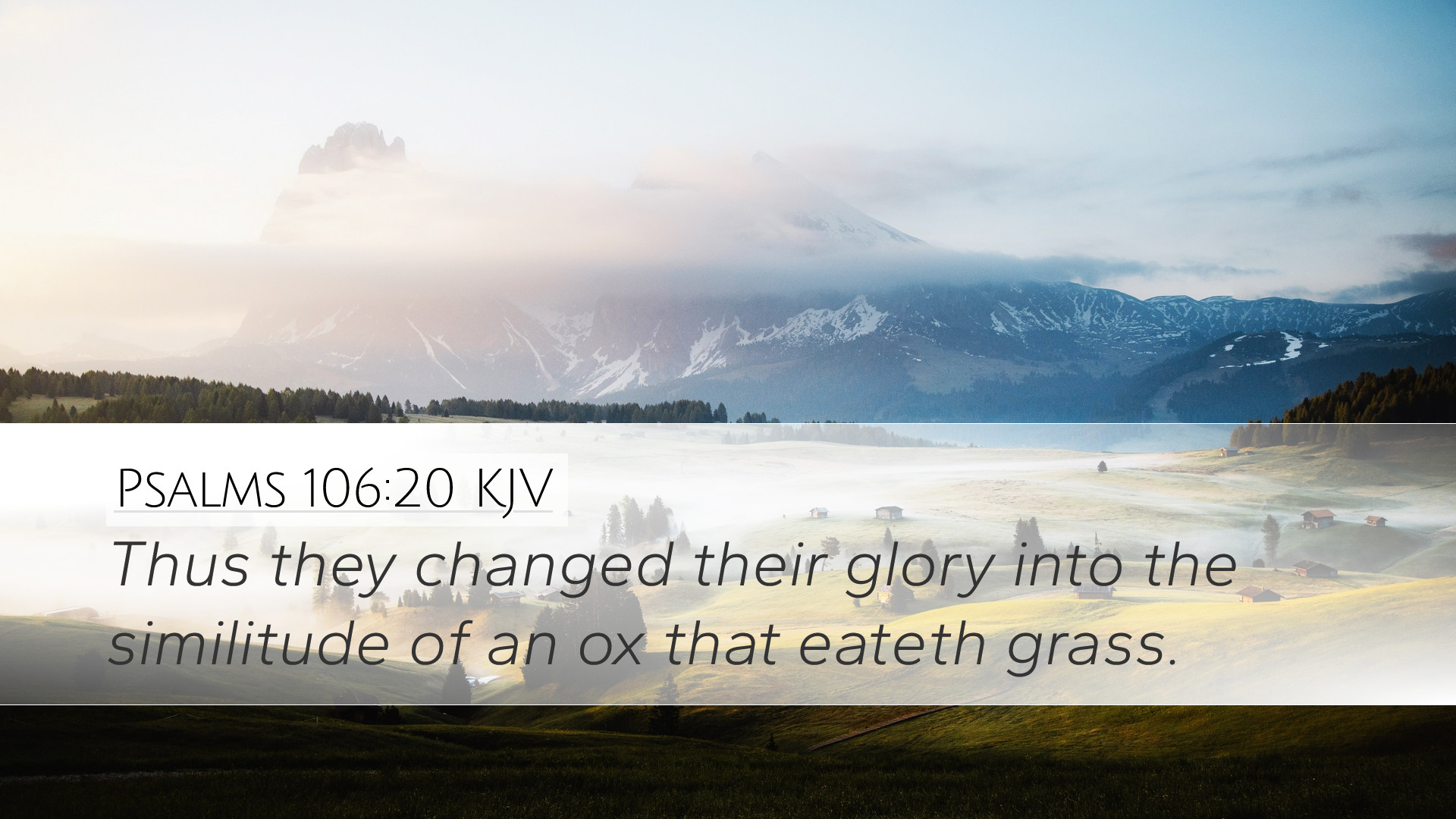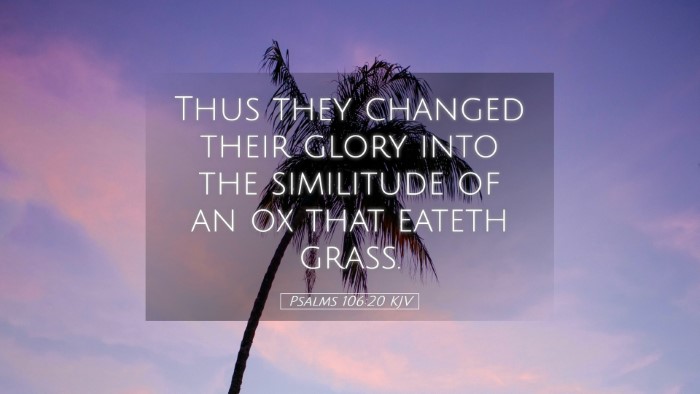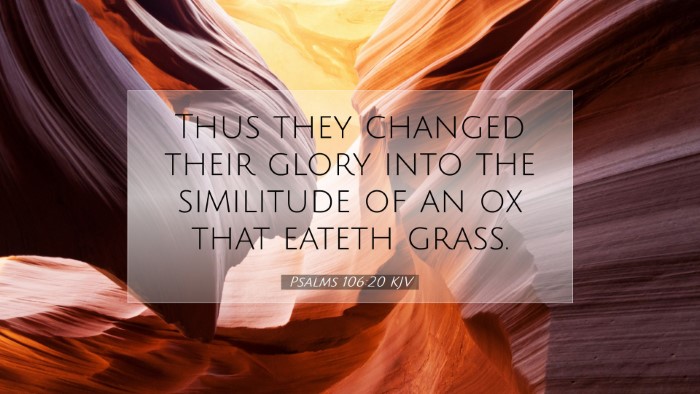Psalms 106:20 Commentary
Bible Verse: "Thus they changed their glory into the similitude of an ox that eateth grass."
Introduction
The verse from Psalms 106:20 encapsulates the grave error made by the Israelites during their wilderness journey, when they exchanged the glory of the omnipotent God for a mere likeness of an idol, in this case, the golden calf. This act of idolatry reflects deep theological implications regarding humanity's propensity to worship created things rather than the Creator. In this commentary, we will explore the insights provided by renowned public domain commentaries, allowing for a enriched understanding for pastors, students, and theologians alike.
Contextual Background
Psalms 106 serves as a historical reflection on Israel’s behavior toward God throughout their history. The psalm is attributed to a post-exilic context, likely intended to remind a wayward people of their heritage and the consequences of forsaking the true God. Here, the psalmist recounts the various sins of Israel, illustrating the theme of divine mercy contrasted with human rebellion.
Commentary Insights
Matthew Henry's Commentary
Matthew Henry points out that the verse strikingly highlights how the Israelites "changed their glory" - that is, they exchanged the majesty and power of God for a created image. This commentary emphasizes the absurdity of such a decision, showcasing the folly of replacing the awe-inspiring God with something that is inherently inferior. Henry elaborates on the nature of the idol, an "ox that eateth grass," which symbolizes earthly creatures having no true divinity or strength. Henry’s reflections serve as a reminder of the ongoing struggle between faith and idolatry.
Albert Barnes' Notes
Albert Barnes reiterates the concept of "glory" as employed in this verse, highlighting that it relates to God's honor and majesty. He notes that to change God's glory for an idol is not merely an artistic mistake, but a profound theological transgression. Barnes emphasizes that this idolatry was not an isolated incident but rather a motif throughout Israel's history. He calls attention to the human tendency to create gods of convenience, and how Israel's actions serve as a lesson on the consequences of turning away from the true God. The aspect of "similitude" serves as an important theological notion, highlighting humanity's perpetual struggle with idolatry.
Adam Clarke's Commentary
Adam Clarke provides a detailed historical analysis, explaining the events surrounding the making of the golden calf as narrated in Exodus 32. He points out that the Israelites, feeling abandoned in the wilderness, sought a tangible representation of divinity. Clarke underscores that this reflects a lack of faith and an inability to perceive the true nature of God, leading to the creation of illusory substitutes for worship. He illustrates the damage such actions can cause within a community of believers, and warns modern readers against the same behaviors. Clarke also focuses on the implications of idolatry that extend beyond the Israelites, applying these lessons to contemporary worship practices.
Theological Implications
The exchange of glory for the likeness of an ox raises several theological questions for the modern believer. It invites contemplation about what each individual or community might be substituting for God in their lives and worship. This transformation signifies a profound failure to recognize and appreciate God's true nature and active role in human affairs.
- Idolatry as a Constant Threat: The commentary collectively warns contemporary believers that idolatry is not merely a relic of ancient history but a constant temptation that can manifest in various forms in today’s world.
- Understanding God’s Glory: Insight from these commentators provides a pathway to deepen one's understanding of what constitutes true glory and help the faithful realign their worship practices accurately.
- The Role of Remembrance: The historical recounting in Psalms serves as a reminder of God's actions throughout history, urging believers to reflect on God's faithfulness when encountering trials.
Practical Applications
For pastors and church leaders, this verse can serve to illustrate preaching on the nature of true worship. It raises topics for congregational discussions about modern-day idols, be it wealth, success, or even personal relationships that can usurp God’s position in one’s life.
For Students of Theology
This commentary prompts deeper explorations into systematic theology surrounding idolatry, divine glory, and a robust understanding of the nature of God that should affect worship practices in the modern church.
For Bible Scholars
The insights gained from this verse encourage scholarly examination of the tension between Israel's historical idolatry and the theological implications for covenantal faithfulness. Discussions could explore how this text has been received in both historical and contemporary contexts.
Conclusion
Psalms 106:20 serves as a poignant reminder of humanity’s tendency to turn to lesser things. The combined insights from Matthew Henry, Albert Barnes, and Adam Clarke not only expand our understanding of scripture but also shake the reader to reconsider the authentic nature of their worship and devotion. As believers, the challenge remains to keep our eyes fixed on the true God, safeguarding our hearts from the allure of modern idols.


